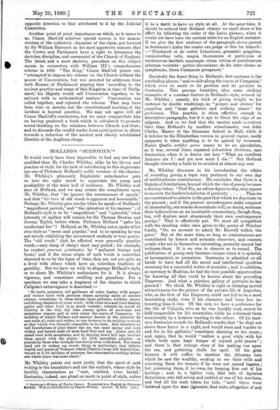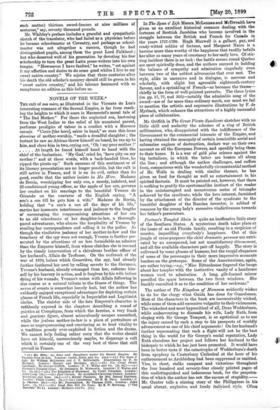HOLLAND'S " SUETONIUS."* IT would surely have been impossible to
find any one better qualified than Mr. Charles Whibley, alike by his theory and practice of style, for the task of introducing to this degenerate age one of Philemon Holland's noble versions of the classics.
Mr. Whibley's pleasantly Euphuistic antechamber puts us into the right mood to appreciate the pomp and prodigality of the main hall of audienee. Mr. Whibley well says of Holland, and we may return the compliment upon Mr. Whibley, that "he ignores the commonness of speech," and that "his love of old words is apparent and honourable." Perhaps Mr. Whibley goes too far when he speaks of. Holland's "magnificent periods," and "the, splendour of his manner " ; if Holland's style is to be " magnificent " and "splendid," what in,tensity of epithet will remain for Sir Thomas Browne and Jeremy Taylor, before whom Philemon Holland "pales his uneffectual fire "7 Holland, as Mr. Whibley notes, spoke of his own style as "mean and popular," and in so speaking he was not merely exhibiting the accustomed modesty of true genius.
The "old words" grat he affected were generally popular words,—racy slang of slang's most racy period ; for example, he renders jocorunt petulantia by " malapert frumps and flouts," and if the mean origin of such words is somewhat obscured to us by the lapse of time, they are not yet quite on a,level ' with others which have an unbroken tradition of gentility. But we have no wish to disparage Holland's style, or to abate Mr. Whibley's enthusiasm for it. It is always vigorous, and sometimes swelling and grandiose. For a specimen we may take a fragment of the chapter in which Caligula's extravagance is described :— "He built, moreover, tall galliasses of ceder timber, with poupes and sternes beset with precious stones, carrying sailes of sundrie colours, conteining in them baines, large galleries, walking places, and dining chambers of great remit : with vines also and trees bearing apples and other fruit in as much varietie : wherein he would sit feasting in the very day time among quires of musicians and melodious singers, and so saile along the coasts of Campania. In building of stately Pallaces and mannor houses in the countrey he cast aside all rules and orders, as one desirous to do nothing so much as that'which was thought unpossible to be done. And therefore he laid foundations of piles where the sea was most raging and deep withal, and hewed rocks of most hard flint and rag : plains also he raised even with mountains, and by digging down hill tops levelled them equall with the plains : all with incredible celeritie : as punishing those who wrought but slowly even with death. Poi. summ (and not to reckon up everie thing in particular) that infinite wealth and masse of Treasure which Tiberius Cresar left behind him, valued at 2,700 millians of sesterces, hee consumed to nothing before one whole yeare was gone about.'
Mr. Whibley points out most justly that the merit of such writing is the translator's and not the author's, whose style he forcibly characterises as "curt, crabbed, even brutal." Suetonius, indeed, can plead no merit in point of style, unless • $stetonita's History of Twelve Cesar& Translated into English by Philemon Holland. With an Introduction by Charles Whlbley. London : D. Nutt. Eds.) it be a merit to have no style at all. At the same time, it should be noticed that Holland obtains no small share of his effect by following the order of the Latin phrases, when it would not have been the natural order for an English narrator. If we give the first sentence of the paragraph above-quoted in Suetonius's Latin the reader can judge of this for himself : —" Fabricavit et de cedris Liburnicas, gemmatis puppibus, versicoloribus velis, magna thermarum et porticuum et tricliniorum laxitate, magnaque etiam vitium et pomiferarum arborum varietate quibus discumbens de die inter chores ac symphonias, Mora Campanile peragraret."
Decidedly the finest thing in Holland's first sentence is the concluding phrase, "and so saile along the coasts of Campania," which owes its merit to its position and its position to Suetonius. This passage furnishes, also, some striking examples of a constant feature in Holland's style, noticed by Mr. Whibley ; namely, his trick of giving weight to his sentence by double renderings, as " poupes and sternes" for puppibus, and "large- galleries and walking places" for portieuum. This practice is often effective enough in descriptive paragraphs, but it is apt to blunt the edge of an epigram. And so we find that the version made a century later than Holland's by another schoolmaster, one John Clarke, Master of the Grammar School in Hull, while it is inferior to the Elizabethan version in general vigour, easily surpasses it when anything is to be gained by terseness. Nero's Qualls artifex pereo ceases to be an ejaculation, as it was, several times repeated (identident dictitans, says Suetonius), when it , is drawn out into "What an excellent Artisane am I! and yet now must I die ! " But Holland thought obscurity a fault to be avoided at almost any cost.
Mr. Whibley discusses in his introduction the ethics of recording gossip, a topic very pertinent to our own day of multitudinous reminiscence. He concludes that there is a Statute of Limitations, beyond which the vice of gossip becomes a shining virtue. "Paul Pry, an odious figure to-day, may appear to-morrow the fearless benefactor of posterity Thus we are constrained to admire in the past that which we deprecate in the present ; and if the present eavesdroppers make. conquest of immortality, our remote descendants will, no doubt, welcome their indiscretions as an invaluable commentary, though they, too, will deplore most strenuously their own contemporary gossips." That is effectively put. We must all sympathise with the standing order once given to the porter of Windsor Castle, "On no account to admit Mr. Boswell within the gates." But at the same time, so long as reminiscences are contributed by honest and accurate observers, and concern people who are in themselves interesting, posterity cannot but welcome them. It is no vice to observe or to record. The publication of gossip only becomes vicious when it is spiteful, or incompetent, or premature. Suetonius is admitted on all hands to have had all the moral and intellectual qualities necessary for a successful writer of memoirs ; and in addition, as secretary to Hadrian, he had the best possible opportunities for knowing all that could be known about the preceding Emperors. And what a priceless gallery of portraits he has painted ! We think Mr. Whibley is right in claiming special attractiveness for the picture of the private life of Augustus, who, as the first of the Emperors, could not fail to be a most fascinating study, even if his character had been less in- teresting than it was. Of the rest, we have a preference for the life of Caligula., who, as he was frankly mad, cannot be held responsible for his enormities, while he redeemed them occasionally by a humour wanting to the others. Of his mad- ness Suetonius records (in Holland's words) that "he slept not above three hours in a night, and would roam and wander to and fro in his galleries," sometimes shouting to the moon ; and, again, that he would 'wallow a good while with his whole body upon huge heapes of ,eoyned gold peeces " ; and there is that strange story of his making war upon the sea, and gathering shells for spoil. . Of his grim humour it will suffice to mention the dilemma into which he cast the wealthy, sending to see their wills and executing them for treason if he were not named legatee ; but poisoning them, if he were, for keeping him out of his heritage ; and, in a lighter vein, that tale of Aponius Saturninus who fell asleep and nodded at one of his auctions, and had all his nods taken. for bids, until there were fastened upon the man (ignorant, God wote, altogether of any such matter) thirteen sword-fencers at nine minims of sesterces," say, seventy thousand pounds.
Mr. Whibley's preface includes a graceful and sympathetic sketch of the translator, who had failed as a physician before he became schoolmaster at Coventry, and perhaps as school- master was not altogether a success, though he had distinguished pupils, among them the great Lord Falkland; but who deserved well of his generation by devoting his fine scholarship to turn the great Latin prose-writers into his own tongue. "Howsoever I have faulted," he writes, "set against it my affection and desire to do some good whiles I live to my sweet native country." We rejoice that three centuries after his death the old scholar's memory should still be green in his "sweet native country," and his labours honoured with so sumptuous an edition as this before us.







































 Previous page
Previous page